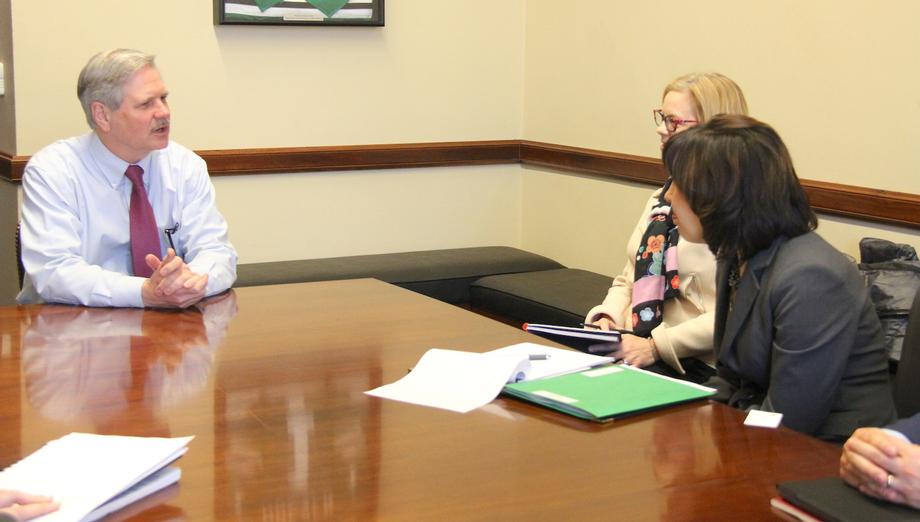Hoeven Meets with Head of USDA Rural Development, Stresses Need to Invest in Rural Infrastructure
Senator’s Meeting Precedes USDA Roundtable on Rural Prosperity in Bismarck
WASHINGTON – Senator John Hoeven, chairman of the Senate Agriculture Appropriations Committee and a member of the Senate Agriculture Committee, this week met with Anne Hazlett, Assistant to the Secretary for Rural Development at the U.S. Department of Agriculture (USDA). During the meeting, Hoeven outlined his priorities for strengthening rural economies and the importance of the programs Hazlett oversees at USDA in helping rural communities compete in today’s global economy.
Specifically, the senator stressed the need to invest in rural infrastructure, including water, electric and broadband services. Their discussion dovetails with Hazlett’s visit to North Dakota next week, where she will be holding a roundtable with Rural Development State Director Clare Carlson in Bismarck on strategies to ensure rural prosperity as well as improved online access to commerce, education and health care services.
“Our rural communities face unique challenges in developing their infrastructure and growing their economies,” Hoeven said. “The programs at USDA Rural Development help ensure our state’s citizens, regardless of their zip code, have access to the services they need to improve their quality of life. I appreciate the opportunity to have this productive conversation with Ms. Hazlett before her trip to North Dakota, and I look forward to continuing to work with her to meet the needs of rural America.”
This week’s meeting comes as part of Hoeven’s efforts as chairman of the Agriculture Appropriations Committee to secure strong support for crop insurance, agriculture research and rural development through annual funding bills. Further, Hoeven continues to meet with farmers, ranchers and other rural stakeholders to gather input on the upcoming farm bill and ensure USDA’s programs work for North Dakota’s agriculture industry and rural communities. The senator’s priorities for the farm bill include:
- Strong Crop Insurance – The senator is working to strengthen and prevent cuts to the crop insurance program, which is the primary risk management tool for many producers.
- Agriculture Risk Coverage (ARC) and Price Loss Coverage (PLC) – Hoeven secured $5 million for a pilot program in the Senate’s Fiscal Year (FY) 2017 Agriculture Appropriations bill, and funding in the Senate’s FY 2018 Appropriations bill, to improve the fairness of ARC payment calculations, while exploring long-term solutions to the problem for the next farm bill.
- Sugar Program – The senator said he will work to extend the sugar program in a bipartisan manner, ensuring that American producers have a level playing field in the world sugar market.
- Agriculture Research – Hoeven will work to include strong support for agricultural research, like the work done at North Dakota State University and the North Dakota Extension Service, to enhance crop genetics and production.
- Drought Support – Hoeven continues working to secure all possible support for farmers and ranchers to help them weather the drought. The senator is also working to improve the livestock assistance programs in the next farm bill and ensure they work for ranchers when needed most.
In addition to the programs at USDA, Hoeven is pursuing innovative new solutions to help local communities fund their infrastructure. The senator has introduced two pieces of legislation to do just that, the Move America Act and a bill to reauthorize the Water Infrastructure Finance and Innovation Act (WIFIA).
The Move America Act is bipartisan legislation that would complement public funding in infrastructure, including investments in rural America, through tax credits and tax-exempt bonds. Qualified projects include roads, bridges, transit, ports, rail, airports, water and sewer facilities and rural broadband.
Hoeven’s bipartisan WIFIA legislation would help stimulate investment in water infrastructure, such as flood control, storm water management and wastewater treatment, by providing long-term, low-cost loans and loan guarantees. The bill would make these loans available through Fiscal Year 2024 under the Environmental Protection Agency (EPA) and the U.S. Army Corps of Engineers. It would also consolidate the administration of the program under the EPA’s pre-existing infrastructure for WIFIA loans, which would allow the Corps to move forward on identifying eligible projects.
-###-
Next Article Previous Article

